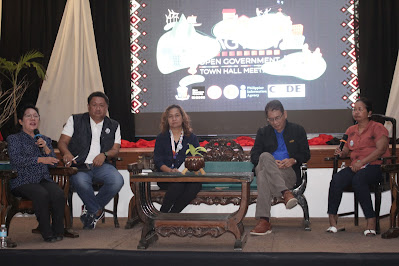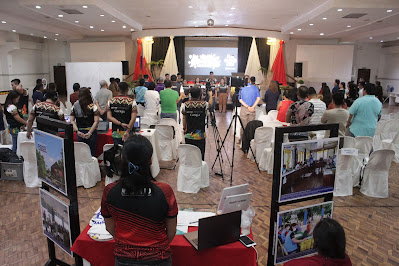Caraga Reg’l Dagyaw 2023 features stories of hope and action
By Jennifer P. Gaitano
BUTUAN CITY – Different sectors in Caraga region have once again convened for this year’s Regional Dagyaw Town Hall Meeting at Balanghai Hotel and Convention Center, this city. This is the fifth Dagyaw since 2019 that talks about various issues and concerns and how the different sectors create resolutions and development actions for the Caraganons.
Assistant regional director and officer-in-charge Donald Seronay of the DILG Caraga, bared that the 2023 Dagyaw Town Hall meeting strives to improve trust and confidence between the People and the Government by providing an open, neutral, and protected space for dialogue for multiple sectors across society.
“Our national government agencies likewise express their support in this event, wherein different sectors are working together for the development of all Caraganons,” he said.
OIC Seronay also recalled that the first Dagyaw tackled peace and development for Indigenous Peoples (IPs) in 2019; COVID-19 Response in 2020; supreme court ruling on Mandanas in 2021; and mental health and education in 2022.
He also emphasized that the potable water system and livelihood farming are the two most common topics raised for this Townhall meeting. “With this activity, it is essential to listen and address these concerns not only to provide hope but proactive action in order to establish a strong partnership between the government and the people, and to encourage stronger participation and support for government programs.”
“May this activity become an avenue to gain support from all other sectors, and be part of participatory governance, changing the lives of the Filipino people,” added Seronay.
Alma Eleazar, honorary member of Local Government Training and Research Institutes – Philippine Network, Inc. (LOGOTRI-Philnet), who served as the moderator of the town hall meeting also acknowledged the vital roles of every sector in sustaining peace and development through the conduct of dialogue.
“We would like to hear and listen to stories from the representatives of the different sectors during our Dagyaw Town Hall meeting today. And we are all called in this even to a listening heart,” she said.
On potable water
Cerela Selim, a resident of Barangay Rita Glenda of Basilisa, Province of Dinagat Islands, shared how the locals in their barangay get water to drink. She recalled their experiences and their difficulties especially during the COVID-19 pandemic, until such time that the Gawad Kalinga, a civil society organization has reached their place and facilitated the provision of a clean potable water.
“We hope that our barangay will be provided with sustainable clean potable water for our people. Clean water is important for us in our day-to-day activities; hence we have to ensure that it is safe to drink,” she said.
Jerese Joy Santos, area team leader from Gawad Kalinga (GK) also called on the locals in Barangay Rita Glenda to steward the water source for the potable water that is put in place in their barangay.
Also, Esterlita Villamor, deputy regional program manager from the Department of Social Welfare and Development (DSWD) Caraga, revealed that the Department continuously engage with other government agencies in coming up with a barangay development plan as they want to address the needs of the locals in the barangays. She further elaborated that in providing water sources, the Department of Health (DOH) Caraga leads the monitoring of water and sanitation requirements.
For his response, Mark Lynde Gascon, medical technologist II of DOH Caraga, emphasized that before a water source is established in an area, certain requirements and processes based on the manual procedures should be undertaken, and the rural health units are the counterparts and responsible for the water collection in the barangays.
“The DOH through the Environmental and Occupational Health Program, we encourage our local government units to establish their local drinking quality monitoring committee responsible to regulate the existing water service providers or water refilling stations. Should they have concerns on water, this is the appropriate body or committee to look into this,” said Gascon.
PIA as member of TWG for Dagyaw
In her message of commitment, regional director Venus Garcia of the Philippine Information Agency (PIA) Caraga, underscored that the role of PIA as member of the technical working group for Dagyaw is essential in communicating to the people the continuous convergence of various sectors to catapult the growth of the nation.“Our membership is not just in compliance with our mandates, but it is more importantly a manifestation of our unwavering support to the “Bayanihan” that this initiative is pushing for – the togetherness between the government and the other sectors that will serve as the catalyst in achieving the common goal for our countrymen, and that is to give them a safe and comfortable life,” Dir. Garcia said.
Dir. Garcia also highlighted that Dagyaw proves how crucial the open governance and public participation are in the success of government plans and initiatives for its people. “As the government’s communication arm, the Philippine Information Agency Caraga will continue to perform its part in creating a wider access to crucial information from the discussions created in this platform. We also commit the same level of fervent support to this initiative in the upcoming town hall meetings that will take place in the provincial level, which we are looking forward to,” she added.
On livelihood on farm
Tessie Barcelon, resident from Barangay Abilan, Buenavista, Agsuan del Norte, shared how she started her own business, as a way to give inspiration to other Caraganons. She asked the government agencies concerned to have a permanent market where she and the rest of the micro, small and medium enterprises (MSMEs) could sell their products, that in such way, they could also sustain the needs of their families.
“As a senior citizen – entrepreneur, I really hope that the government could help us have a long-term market, where we could continuously sell our products and that it won’t be that difficult for us to sustain our livelihood,” she said.
With this concern, Victor Emmanuel Ozarraga, director of Gawaga Kalinga Builders Institute, revealed that Caraga region is one of the regions that has high poverty incidence in the country. “As indicated in our Regional Development Plan in Caraga, there is somehow a decrease in the poverty incidence, however Caraga remains at 33.2%. So, we could imagine that in every 10 persons, there are three that belong to the poor,” he said.
Ozarraga added that people may have a livelihood, yet it is not a guarantee that they are living a quality and dignified life. “The purpose of our economy is to help people uplift their lives, and experience a life free from dodgery,” he said.
Assistant regional director Rey Cueva of the Technical Education and Skills Development Authority (TESDA) Agsuan del Norte, said that their office is willing to provide the necessary interventions to the local entrepreneurs in the barangays in terms of skills and livelihood trainings depending on their need.
“In TESDA, it is purely skills component that we could provide while giving livelihood packages are in partnership with the local government units, Department of Trade and Industry (DTI), DSWD, and Department of Labor and Employment (DOLE),” he said.
He added that since Barangay Abilan is more on rice production, TESDA will conduct small engine repair to help them troubleshoot their farm machineries, as well as in the conduct of training on welding fabrication.
DTI Agusan del Norte, on the other hand through provincial director Lorijane Sacote, reiterated that each city and municipality has a Negosyo Center, where locals could ask assistance for their own business.
“The DTI suggests that you create a cooperative for your handicraft products, so the department could better assist you and help you get a wider market outlet in the province. We also conduct some 20 entrepreneurial training sessions for your organizations,” she said.
Another life experience was shared by Nilda Grumacon, a resident from Barangay Suyangan in General Luna, Surigao del Norte. She relayed that people in their area have difficulty in marketing and delivery of their products to other places. Considering the situation, she said they then engaged in vegetable and root crops farming, which really helped them in sustaining their daily consumption aside from selling it to the market.
“Later on, the government also provided us with livestock to support our livelihood. As we engage into vegetable and root crops farming, the Gawad Kalinga also extended help in our community,” said Grumacon.
Dr. Jessie Beldia, officer-in-charge of the Agricultural Training Institute (ATI) Caraga, assured the locals of General Luna that the Agency will provide them seedlings and basic farm implements.
“Should you need to have training about vegetable gardening, I’ll check for the available training courses for the second semester that we could possibly provide for you. Our office also has a scholarship program of which your children could avail of,” he said.
Also, Johnny Concon, regulatory chief of the Department of Agriculture (DA) Caraga, disclosed that the main objective of DA is to help and empower the farming and fishing community and the public sector to produce enough, affordable, and accessible food for the Filipinos.
“DA has five banner programs. We have the livestock program with production support services; next is the rice program; corn program; national urban and peri-urban agricultural program (NUPAP). We will be considering your needs and we will assist you in whatever way possible,” cited Concon.
To sum up all the issues and concerns raised during the Dagyaw, Annabel Yangson, Local Government Capability Development Division (LGCDD) chief of DILG Caraga, expressed her hope that more sectors will continue to actively engage in community activities and also in the next Dagyaw in the provincial level.
“We would like to believe that with the engaging actions, and discussions earlier today, has clarified and presented tangible specific actions from our concerned government agencies, and we are taking notes of the questions raised that we could also refer to DOLE to address the needs of the sector. The DILG also implements projects on infrastructure such as farm-to-market road, water and sanitation, school buildings, health center, street lighting, among others. It is indeed the clamor of the majority of the communities in the region because statistically speaking from Fiscal Year 2021 to present 2023, the water and sanitation project is included, next to farm-to-market road, and followed by water. There have been 118 projects implemented in the region and we are monitoring all these,” Yangson explained.
She further stressed the need to intensify establishment of more civil society organizations in the region and be able to identify quality and community-driven projects, as well as be an active partner in the creation of the Barangay Development Plan.
Meanwhile, in her closing message, Jenneth Partosa, assistant regional director of the Department of Budget and Management (DBM) Caraga, thanked all the participating sectors of this year’s Regional Dagyaw for their support and active participation.
“We hope that everyone learns something from our resource speakers and of course from our sharers, and we are also happy that you gave important inputs in today’s discussion during the open forum. May this activity inspire us to have proactive actions and build a strong partnership by actively participating and supporting all government programs and policies,” highlighted Partosa.
This year’s Regional Dagyaw Town Hall Meeting is anchored on the theme: "Building a Better Government-Citizen Engagement; Quality Public Participation and Dialogue.”
The town halls serve as an avenue for citizens to engage with the different programs and services of the government and provide feedback for improvement.
Dagyaw is a Hiligaynon word which means “togetherness” or “Bayanihan”. (JPG/PIA-Caraga)



